Redwoods
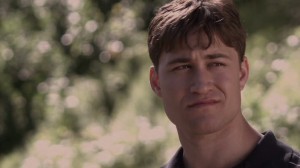 There aren’t a lot of flaws in Doug Liman’s Swingers. The humor and insight into heterosexual insecurities and arbitrary rules is just as insightful nearly 15 years later, which is a credit to writer/star’s Jon Favreau’s script. But if there’s one distracting element, it’s a scene where Favreau blows a potential one night stand because he won’t stop talking about his ex, whom has moved onto another guy. The girl, trying to console Favreau, says, “It won’t last. It’s a rebound.” Favreau desperately responds with, “We were a rebound, and we lasted six years.” To which the girl tries to reassure him with, “Yeah, but how long was the relationship she was rebounding from?” Favreau’s response, straight-faced, is, “six years.”
There aren’t a lot of flaws in Doug Liman’s Swingers. The humor and insight into heterosexual insecurities and arbitrary rules is just as insightful nearly 15 years later, which is a credit to writer/star’s Jon Favreau’s script. But if there’s one distracting element, it’s a scene where Favreau blows a potential one night stand because he won’t stop talking about his ex, whom has moved onto another guy. The girl, trying to console Favreau, says, “It won’t last. It’s a rebound.” Favreau desperately responds with, “We were a rebound, and we lasted six years.” To which the girl tries to reassure him with, “Yeah, but how long was the relationship she was rebounding from?” Favreau’s response, straight-faced, is, “six years.”
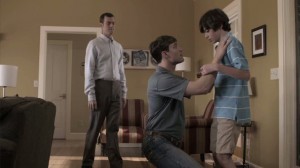 With the later knowledge that Favreau’s character in Swingers met his ex in college when the “girls drink, they don’t really know what they’re doing,” suggests that she was at the early, reckless stages of college, no older than 18 or 19, and that her previous relationship started when she was 12. It’s hard to believe and confusing that a relationship would start at 12 and continue through a portion of college.
With the later knowledge that Favreau’s character in Swingers met his ex in college when the “girls drink, they don’t really know what they’re doing,” suggests that she was at the early, reckless stages of college, no older than 18 or 19, and that her previous relationship started when she was 12. It’s hard to believe and confusing that a relationship would start at 12 and continue through a portion of college.
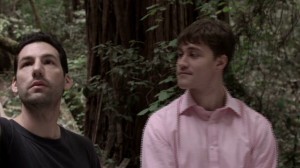 David Lewis’ Redwoods suffers from a similar problem. But rather than be a small detail gone awry, like in Swingers, the distracting element is front and center in Redwoods. The lead character in Redwoods, Everett (played by Brendan Bradley), says that he has been in a relationship with his visibly older partner for seven years, and they’ve adopted an autistic child during that time. Everett, who looks like a young Chris Klein with a bowl-cut, looks and acts no older than 23 or 24, meaning that he was able to adopt a child (who appears to be about 8 ) when he himself was still a child. (Impossible for a straight couple, science fiction for a gay couple.)
David Lewis’ Redwoods suffers from a similar problem. But rather than be a small detail gone awry, like in Swingers, the distracting element is front and center in Redwoods. The lead character in Redwoods, Everett (played by Brendan Bradley), says that he has been in a relationship with his visibly older partner for seven years, and they’ve adopted an autistic child during that time. Everett, who looks like a young Chris Klein with a bowl-cut, looks and acts no older than 23 or 24, meaning that he was able to adopt a child (who appears to be about 8 ) when he himself was still a child. (Impossible for a straight couple, science fiction for a gay couple.)
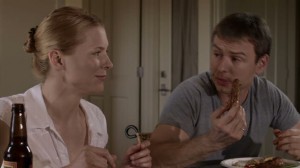 Redwoods’ screenplay peddles one far-fetched situation after another, in the guise of a down-to-earth romantic fable, daring you to take it seriously. The film is filled with inspirational nature montages, sappy music, soap opera level acting and production values—practically inviting rampant heckling. Everett cheats on his boyfriend, Miles, because … well … it’s not clear. Their one early scene together has Miles being distracted by their son instead of listening to Everett talk about supermarket coupons. How selfish of Miles!
Redwoods’ screenplay peddles one far-fetched situation after another, in the guise of a down-to-earth romantic fable, daring you to take it seriously. The film is filled with inspirational nature montages, sappy music, soap opera level acting and production values—practically inviting rampant heckling. Everett cheats on his boyfriend, Miles, because … well … it’s not clear. Their one early scene together has Miles being distracted by their son instead of listening to Everett talk about supermarket coupons. How selfish of Miles!
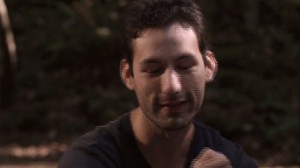 The meet-cute between Everett and his paramour Chase (played by Matthew Montgomery, the only halfway palatable performance in the movie) is strained to the point where it should be a joke, but isn’t. Chase randomly stops in front of Everett isolated house to ask for directions, and it’s lust at first sight. With a little musical tweaking, Redwoods could easily have turned either into hard-core porn or a thriller at this point. (Instead, we get comedic scenes where Lewis punches up the jokes with a single horn note that comes right out of early silent shorts, as if to signal to us how wacky Everett’s cartoonishly supportive family is.)
The meet-cute between Everett and his paramour Chase (played by Matthew Montgomery, the only halfway palatable performance in the movie) is strained to the point where it should be a joke, but isn’t. Chase randomly stops in front of Everett isolated house to ask for directions, and it’s lust at first sight. With a little musical tweaking, Redwoods could easily have turned either into hard-core porn or a thriller at this point. (Instead, we get comedic scenes where Lewis punches up the jokes with a single horn note that comes right out of early silent shorts, as if to signal to us how wacky Everett’s cartoonishly supportive family is.)
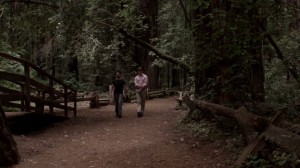 This is all a shame, because Redwoods starts with promise. It has beautiful and textured footage of the California Redwoods and it features a gay character with no interest whatsoever in antiquing. But Chase and Everett’s relationship is simply off. And not just because they behave like melodramatic teenagers with each other, and lack insightful dialogue. But rather that Lewis wants us to root for them, despite the fact that Everett is cheating on his faithful lover and his loving son on a whim. Why is anyone’s guess. The men in the movie are all average looking, but have bodies like sculpted male models (and only the non-sexual situations feature any nudity). And the only thing they have in common is that, while Everett is a failed writer who has moved on, Chase, whose musings we get read to us repeatedly, is on his way to that same plateau. Perhaps realizing all of his conflicting elements, Lewis tries to be meta about the corniness of the movie he’s making by commenting on it. “It’s a little cheesy,” says Everett. If only Redwoods could reach that level.
This is all a shame, because Redwoods starts with promise. It has beautiful and textured footage of the California Redwoods and it features a gay character with no interest whatsoever in antiquing. But Chase and Everett’s relationship is simply off. And not just because they behave like melodramatic teenagers with each other, and lack insightful dialogue. But rather that Lewis wants us to root for them, despite the fact that Everett is cheating on his faithful lover and his loving son on a whim. Why is anyone’s guess. The men in the movie are all average looking, but have bodies like sculpted male models (and only the non-sexual situations feature any nudity). And the only thing they have in common is that, while Everett is a failed writer who has moved on, Chase, whose musings we get read to us repeatedly, is on his way to that same plateau. Perhaps realizing all of his conflicting elements, Lewis tries to be meta about the corniness of the movie he’s making by commenting on it. “It’s a little cheesy,” says Everett. If only Redwoods could reach that level.



